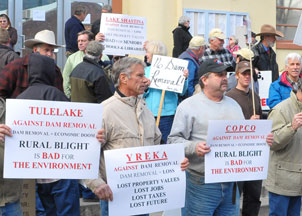On the heels of a large protest on the front steps of the Siskiyou County Courthouse, John Bezdek and Dennis Lynch stepped into the Siskiyou County Board of Supervisors chambers to discuss the Klamath Basin Restoration Agreement and the Klamath Hydroelectric Settlement Agreement.
Lynch is the program manager for the studies currently underway to inform the decision of whether or not to remove four dams along the Klamath River, and Bezdek represents the United States Department of the Interior.
The discussion with the board encompassed a wide range of topics, and Bezdek told the supervisors that he wishes to increase the communication opportunities with the county to inform the processes underway.
One method for achieving that end, according to Bezdek, would be the county’s participation as a Cooperating Agency (CA), which would allow access to studies and experts before the study reports are released to the public in draft form. Responding to concerns from the board, he explained that CA status would not pre-commit the county to conclusions found in studies.
With the issue of CA status came the discussion of money, as the county has often expressed concerns that it does not have the resources to hire experts to evaluate the data being produced. Bezdek told the board that currently there are no funds that can be given to the county, but that the study teams can explore ways to relay information by conference call or through electronic communication.
The board also brought up concerns about the communication from the federal teams in general, and Bezdek stated that a number of the teams are still working through all of the background data in order to know what questions to bring to the county.
According to Bezdek, the goal is to find a way to communicate with the board more frequently, either through similar meetings or by phone.
“I hope that it won’t be another eight to 10 months before I’m back again,” Bezdek said, explaining that he believes greater communication will benefit the county and the study teams.
“We don’t have all of the answers,” Bezdek concluded, “but we will try to get them.”
Concerns over tribal fishery, trap and haul discussed
The board was given a chance to ask questions
of Dennis Lynch and John Bezdek at the meeting,
creating a dialogue on numerous issues.
Water purchasing
District 5 Supervisor Marcia Armstrong stated
that she has found that a fisheries management
panel has suggested that water rights in the
Shasta and Scott river valleys be purchased to
help sustain flows for salmon survival,
expressing a concern that the influence of the
Klamath agreements would extend to those two
basins. Bezdek responded by stating that the
panel’s aim is to search for potential
activities to achieve restoration goals, but
that any concrete plan would need to be vetted
by the public.
Validation of agreements
Locally, the Tulelake Irrigation District (TID) has sought to have its signing of the agreements validated by the Siskiyou County Superior Court, an action mirrored by other irrigation districts in southern Oregon. Responding to Board Chair Jim Cook, Bezdek stated that under United States Bureau of Reclamation (BOR) law, any amendments to agreements between BOR and irrigation districts must be validated.
County Counsel Thomas Guarino noted that the
county has not sought to impede TID’s progress
on that necessary action, but it has opposed the
validation action because it is believed that
TID has requested not only that its actions be
validated, but also the agreements themselves.
Dam removal funding
The state of California must provide $250
million if the dams are to be removed, and Cook
asked what would happen if that funding, which
has not yet been identified, is not found when
the dam removal decision is made. Bezdek
explained that the identification of funding is
required before an affirmative dam removal
decision can be made, and if the funding is not
available, the parties to the agreements must
“meet and confer” to find a solution.
Trap and haul
District 3 Supervisor Michael Kobseff, noting plans to gather salmon to truck them past the Keno reach of the Klamath River, asked why trap and haul has not been considered as an alternative to removing the dams, adding that the lack of review of such programs has led him to believe the agreements are not about saving salmon.
Lynch, explaining that trap and haul has not
been analyzed as an alternative, stated that he
will approach the fisheries team to discuss the
viability of the strategy.
Tribal fishing
According to District 4 Supervisor Grace Bennett, tribes in the Elwha River basin have agreed to impose a five-year moratorium on salmon fishing for themselves during a dam removal process there, and she asked why the agreements have no limits on tribal fisheries.
According to Bezdek, the limits on tribal fisheries were established in the late 1970s and did not need to be repeated in the agreements.

